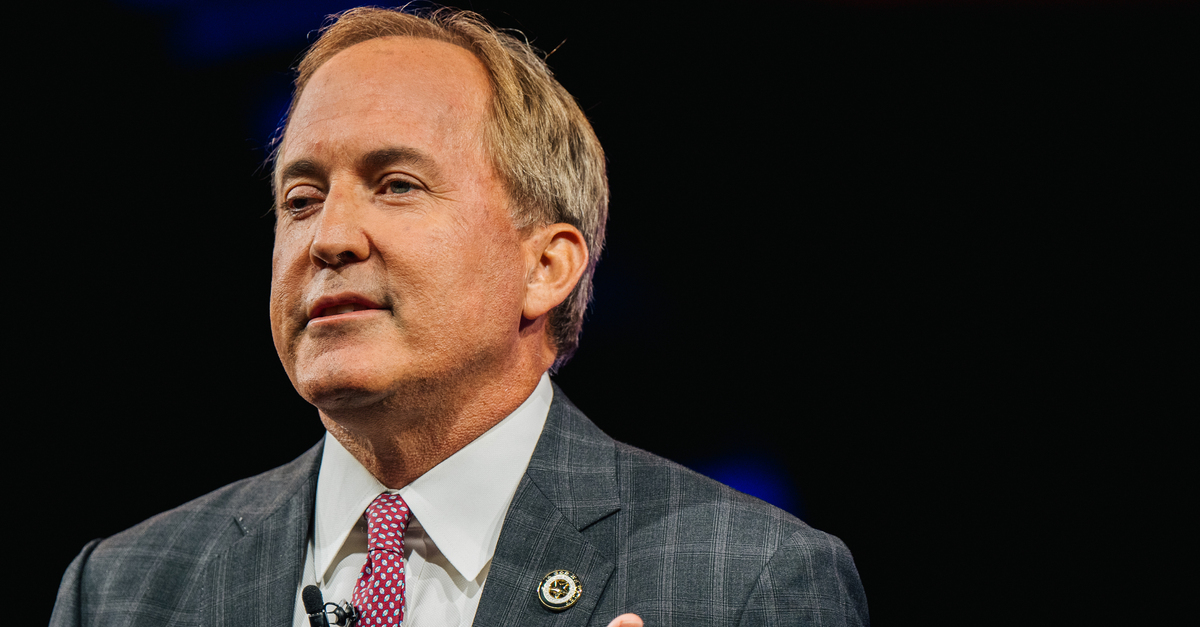
Texas Attorney General Ken Paxton speaks during the Conservative Political Action Conference CPAC held at the Hilton Anatole on July 11, 2021 in Dallas, Texas.
Texas Attorney General Ken Paxton (R) slammed the Lone Star State’s highest criminal appeals court Wednesday for its “shameful decision” that his office lacks unilateral authority to prosecute fellow members of state government for election law violations.
The CCA’s shameful decision means local DAs with radical liberal views have the sole power to prosecute election fraud in TX—which they will never do. The timing is no accident—this is devastating for the integrity of our upcoming elections. Time for #txlege to right this wrong. https://t.co/Hjtkn8SkNk
— Attorney General Ken Paxton (@KenPaxtonTX) September 28, 2022
The all-Republican appeals court (eight of them elected and one appointed by Republican Gov. Greg Abbott) ruled 8-1 that the Texas constitution’s separation of powers mandate blocks Paxton’s office from the kind of prosecutorial authority it desires.
The case grew from the 2016 election of Democrat Zena Stephens, Texas’ first Black female sheriff. Stephens, the incumbent, defeated her Republican challenger in a county that narrowly voted in favor of Donald Trump over Hillary Clinton in the same election. Paxton’s office, however, indicted Stephens in early 2018 for accepting excessive campaign donations.
An FBI investigation found that Stephens received cash contributions in excess of $100 in violation of federal campaign-finance law. It referred its findings to the Texas Rangers, which presented the case to the Jefferson County District Attorney. That prosecutor’s office declined to prosecute Stephens, but Paxton pursued the case against Stephens independently.
Paxton presented the case to a grand jury, secured a three-count indictment for tampering with government records and accepting unlawful contributions. Stephens succeeded in quashing the first count of the indictment on the grounds that the attorney general had no authority to independently prosecute criminal violations. The second two counts remained in place during the parties’ appeal, with Stephens arguing that any attempted delegation of authority to pursue election code infractions violated separation of powers.
The Court of Criminal Appeals (the highest criminal appellate court in Texas) sided with Stephens on Wednesday, but did not issue a majority opinion. However, Judge Scott Walker authored a 12-page concurrence that laid out his take on the basis for the decision against Paxton.
Walker explained that the court’s decision was rooted in its desire to protect the fairness of all elections. He wrote:
It is possible that, in the not-too-distant future, a new politician could be elected as the Attorney General of Texas. If we ruled that the legislature could give the Attorney General the unfettered power to prosecute all election cases, we would be giving every future Attorney General the power to bring possibly fabricated criminal charges against every candidate running for public office in the State of Texas who disagrees with the Attorney General’s political ideals.
The framers of the Texas constitution, said Walker, were “determined to reverse” the turmoil of Reconstruction, and “believed it was best” to clearly separate power into three distinct branches of government. As an executive branch official, said Walker, the attorney general is not a prosecutor. However, Walker pointed out, “the fact that the Attorney General does not have the authority to prosecute crimes, including Election Code offenses like voter fraud or campaign finance violations, does not mean that those crimes will invariably go unchecked.” Rather, he said, “The duly-elected district and county attorneys certainly can and should prosecute those cases.”
For those who disagree with this system, Walker said, “The remedy is not for the courts to water down the Texas Constitution from the bench.” Rather, an amendment to the Texas constitution is what would be required.
Paxton himself faces felony fraud charges pending in Collin County, Texas. The case against him alleges that Paxton lured investors into a stock deal without disclosing his personal interest while he was a member of the Texas legislature. Paxton has denied all wrongdoing.
Earlier this week, Paxton made headlines for dodging a process server outside his home. The AG took exception to the suggestion that he knowingly fled to avoid being served with a subpoena to testify in an abortion-related lawsuit.
It’s clear that the media wants to drum up another controversy involving my work as Attorney General, so they’re attacking me for having the audacity to avoid a stranger lingering outside my home and showing concern about the safety and well-being of my family.
— Attorney General Ken Paxton (@KenPaxtonTX) September 27, 2022
(Photo by Brandon Bell/Getty Images.)
Have a tip we should know? [email protected]